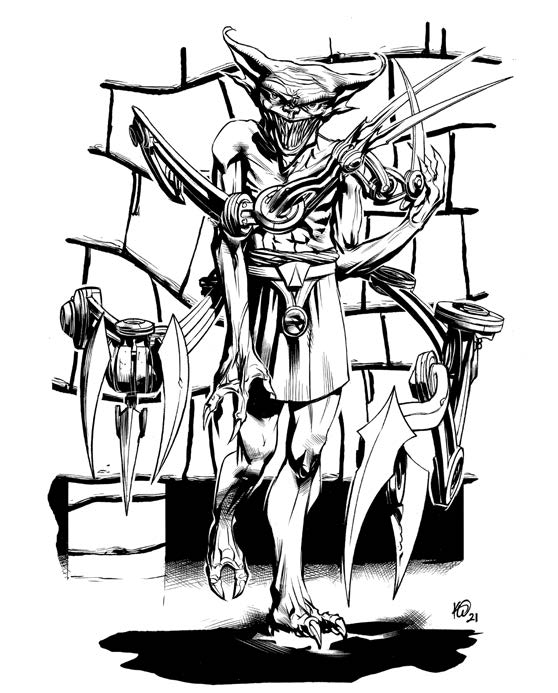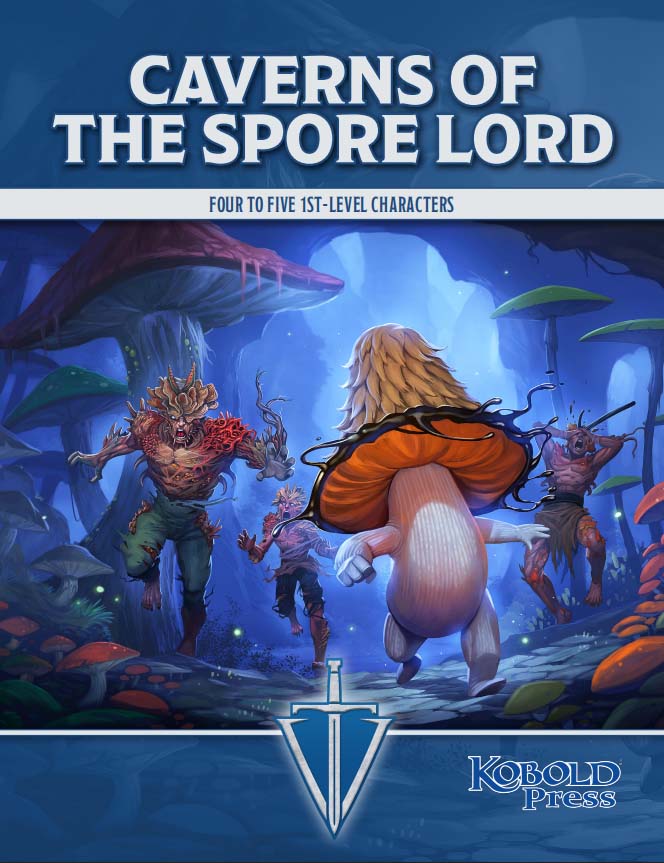From the pages of Warlock 25: Dungeons!
“Introduce a little anarchy. You know the thing about chaos? It’s fair!” (The Joker)
In the quest for creativity, writers and game designers—and everyone, really—resort to all sorts of techniques to “get the juices flowing.” At the very beginning of my career, I bought a book titled A Whack on the Side of the Head by Roger von Oech, Ph.D. The subtitle was “How to Unlock Your Mind for Innovation.” It covers ten major concepts on how to free your mind from conventional thought limitations, plus a host of minor ones. It’s a useful and insightful book, but it’s aimed more at business innovators in general and at Silicon Valley in particular than at creative writers. Similar books specifically for writers are also common of course; Whack just happens to be the first book on creativity I ever bought or read, so it looms large in my experience.
Creating material for roleplaying games isn’t the same as engineering a new smartphone or finding ways to speed up an assembly line. Those tasks are tethered to the real world. The most revolutionary manufacturing idea ever conceived is in fact worthless if it depends on technology that can’t be built. RPGs, on the other hand, can be flights of pure fancy. Anything you can imagine can be put to use. The challenge is to imagine things that are exciting, challenging, and above all fresh.
When we sit down in front of a blank sheet of mapping paper or a blank word processor screen with the task of creating something exciting, challenging, and fresh for players, we face many hurdles. I won’t even try to enumerate them all. No matter how exhaustive I make my list, I’d leave out something important. Instead, the one problem I’m focused on here is the fact that our thinking falls into patterns. When facing that blank sheet of paper, we fall back on the same favorite, familiar ideas and tropes over and over. Your ideas and tropes probably are different from mine, but we all have them. I, for example, grew up reading pulp stories and juvenile horror, and those tales loom large in my subconscious. I still love them, and their common archetypes and stereotypes—bold heroes, egomaniacal but cowardly villains, improbable situations, melodrama, and narrow escapes—always intrude into my ideas when I’m planning a new fantasy adventure or set of rules. That’s true regardless of the theme, tone, or setting. It’s just who I am. That doesn’t mean I only create pulp material. It just means a “pulp aesthetic” is always in my mind, whether it’s front and center or skulking on the sideline.
This is mostly a positive thing. Our influences and predilections help give each of us a unique voice when it comes to creating an RPG adventure, designing a rules supplement, or writing fiction. Readers enjoy getting a glimpse into the writer’s mind as long as it’s not too frightening a place.
After you’ve dipped into that same well of favorite ideas three, four, or a dozen times however, players and readers may start losing interest. Even you may start losing interest when you find yourself writing essentially the same ideas over and over.
If you’re a GM, here’s a good exercise to try: ask your players what themes, motifs, and events they’ve spotted multiple times in your adventures. Sometime when you’re sitting around the (probably virtual) table before the game begins or after it’s wrapped up for the session, ask for honest feedback on this. Don’t debate, and for god’s sake don’t argue. Just listen. Asking questions is okay, but the point is to hear the players’ opinions, not to give yours. And you’re not looking for opinions on what you do right or wrong as a GM; that’s an important but separate conversation. You just want to hear their answers to the question, “What are my tropes?” You might even raise the question at the end of one game session and ask players to bring their answers to the next session. People tend to come up with better insights when they have time to think.
If you’re the type of GM who thinks about these things much, many of the answers shouldn’t surprise you. But I’d be surprised if a few don’t cause at least one of your eyebrows to arch upward.
There are two reasons why an answer could surprise you. Reason one is obvious: players mentioned something you’re not even aware you do. This could be as trivial as all your bartender NPCs having Scottish accents or as detrimental to suspense as important NPC allies almost always turning out to be secret minions of the villain who betray the heroes just before the climactic scene. Reason two is less obvious: players mentioned something you’re aware of, but you didn’t think you do it that often. Only you do, and they couldn’t help but notice.
Let’s get out of that rut.
It’s Out of My Hands
A wonderful way to redirect your creativity into new paths is to take some of the decision-making out of your hands. This won’t necessarily break old habits. It just short-circuits them or redirects around them; choose your own metaphor.
To accomplish that, all you need to do is make a few key decisions randomly.
For example, instead of making your top villain a dragon, make a list of a half-dozen other creatures that aren’t dragons and let a d6 decide. Or if you simply must have a dragon, then instead of putting its lair in a mountainside cave, make a list of a half-dozen other locales—ruined abbey, abandoned quarry, flooded village, big-city sewer, monumental hypostyle, ash-choked forest—and let the die choose.
By letting fate decide, you’re no longer in a position to let your preferences and favorite tropes steer the outcome. They’re out of the decision loop.
My first serious encounter with the power of this type of random decision-making occurred in the game Skyrealms of Jorune. Jorune is a unique setting for an RPG, created by writer Andrew Leker and illustrator Miles Teves. It combines elements of fantasy and science fiction, and it features a mix of PC and NPC races unlike those in any other game. The closest comparison might be to Empire of the Petal Throne. The two games take completely different approaches, but they’re somewhat similar in atmosphere.
Skyrealms included tables to randomly generate encounters. Random tables for generating almost everything were common in the early years of RPGs. These tables produced more than just a type of creature and whether it was friendly or hostile. They told you the type of creature, its background or profession, what motivated the NPC to approach the characters, one or two quirks the NPC might display, and what’s happening nearby that could affect the encounter.
I had a low opinion of such tables at the time (circa 1985), but everything else about Skyrealms impressed me, so I decided to give these a chance. On my first pass through, the tables spat out a bronth NPC (think of the bronth as a bear-man). Its quirk was “hates a race.” Okay, my bronth is a racist. The table didn’t specify which race it hated, so I rolled again on the race table and got… bronth.
At that point, my reaction was, “That makes no sense.” My keen affection for Jorune wasn’t diminished, but that result confirmed all the reasons why I disliked these kinds of tables in the first place. I skipped over that section of the book.
A few days later, in a conversation with a co-worker about a similar topic, he said something that completely changed my thinking on the subject. He said, “If it doesn’t make sense, you haven’t thought about it enough.”
That simple statement is more profound than it sounds, so let me repeat it: If it doesn’t make sense, you haven’t thought about it enough.
The reason it’s so profound is because that philosophy is one of the fundamentals of creativity. Creativity isn’t just coming up with new images, ideas, or objects from whole cloth. It’s also taking two or more ideas and exploring all the ways they can work together.
I dismissed the bronth-who-hates-bronth because it didn’t instantly make sense to me. It didn’t fit easily into any of the preexisting fantasy cubbyholes in my mind. It wasn’t one of the familiar tropes I habitually fall back on.
I can’t say why that co-worker’s simple-seeming comment stuck in my mind so persistently, but I’m grateful it did. Shortly afterward, I was again perusing Skyrealms, and the ridiculous bronth came back to mind. If it doesn’t make sense, you haven’t thought about it enough. It certainly didn’t make sense, so I thought about it.
What if the bronth doesn’t hate all bronth, it only hates itself? A self-loathing bronth…
That notion hit me like thunder. It was a concept I would never, ever have come up with for an NPC if left solely to my own ideas. And it would be a terrific character to roleplay as the GM. What fun I could have with an NPC like that!
My eyes were opened to vast possibilities in that moment.
I realized no one’s creativity needed to be a prisoner to their own habits and patterns. The phrase “think outside the box” was gaining currency at that time. Here was a way you could literally force yourself to think along lines you’d never follow on your own.
The key—the piece of the puzzle that completes the picture—is, If it doesn’t make sense, you haven’t thought about it enough.
Designer Matt Finch wrote a massive collection of random tables called the Tome of Adventure Design. They’re intended to aid the GM who wants to come up with more engaging adventure scenarios. It’s over 300 pages of randomly selected jolts to the brain. In the introduction, Finch states that the point of incorporating randomness into your adventure writing is “to deliver cryptic results designed to shock the reader’s creativity into filling in the gaps.” So obviously, I’m not the only person to arrive at this realization.
Let me emphasize his use of the word “shock” in that passage. It’s perfect. The moment when two, three, or more nonsensical, fragmentary, contradictory notions gel into a coherent and fresh idea is shocking. It’s revelatory. It’s magical. And it’s inspiring…
___
Read more of this and other great articles in Warlock, only on Patreon!



